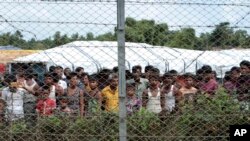The United Nations says Rohingya Muslims and other minorities in Myanmar are experiencing an upsurge in violations and abuse fueled by prejudice and hate speech. The U.N. High Commissioner for Human Rights submitted a report on the root causes of abuse in Myanmar to the U.N. Human Rights Council in Geneva.
Introducing the report, U.N. rights chief Michele Bachelet said laws and policies promoting discrimination and exclusion against religious and ethnic minorities in Myanmar have existed for more than half a century.
“They have contributed to and perpetuated violence, extreme poverty, exploitation and dispossession. Notably, the 1982 citizenship law rendered stateless a significant proportion of the Rohingya and other Muslims, compounding their vulnerability,” Bachelet said.
Oppression of the stateless Muslim minority peaked in August 2017. That was when violence and persecution, reported killings and rapes by the Myanmar military triggered a mass exodus of more than 700,000 Rohingya to Bangladesh.
Bachelet said other ethnic and religious minorities across Myanmar also suffer serious human rights violations at the hands of the military. She said its counter-insurgency policies and tactics at times have deliberately targeted civilians.
“The recent upsurge of xenophobia and violence can also be partly attributed to the stresses and uncertainties of Myanmar’s current transition from decades of authoritarian rule. The dramatic expansion of public access to social media has enabled extremist and ultra-nationalist movements to propagate messages inciting hatred and violence, fueling communal tensions,” the U.N. rights chief said.
Bachelet urged Myanmar’s government to de-escalate xenophobic, discriminatory practices and to promote inter-faith and inter-ethnic tolerance.
Myanmar’s ambassador to the U.N. in Geneva, Kyaw Moe Tun, said his government’s efforts to achieve national reconciliation and peace with ethnic armed groups are advancing. But he added that transforming the country from authoritarian rule into a democratic federal union takes time.
He said his government is concerned about the conflict in Rakhine state and those affected by it, but disclaimed responsibility for the events that triggered the exodus of the Rohingya.
He blamed the mass displacement and current humanitarian situation of the Rohingya on terrorist attacks by ARSA, a Rohingya insurgent group active in northern Rakhine state.




